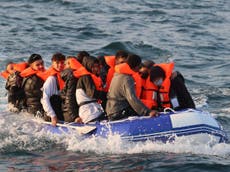Migrants trying to reach UK may jump on queuing lorries in France, says Border Force head
Border closure ‘may have a displacement effect on illegal migration’, MPs told
Your support helps us to tell the story
From reproductive rights to climate change to Big Tech, The Independent is on the ground when the story is developing. Whether it's investigating the financials of Elon Musk's pro-Trump PAC or producing our latest documentary, 'The A Word', which shines a light on the American women fighting for reproductive rights, we know how important it is to parse out the facts from the messaging.
At such a critical moment in US history, we need reporters on the ground. Your donation allows us to keep sending journalists to speak to both sides of the story.
The Independent is trusted by Americans across the entire political spectrum. And unlike many other quality news outlets, we choose not to lock Americans out of our reporting and analysis with paywalls. We believe quality journalism should be available to everyone, paid for by those who can afford it.
Your support makes all the difference.Migrants trying to reach Britain may jump on lorries queuing to cross the English Channel after France closed its borders, officials have warned.
All crossings have been stopped for 48 hours after Boris Johnson announced the discovery of a new strain of coronavirus, causing tailbacks on both sides.
The Border Force director-general said queueing lorries in France “may have a displacement effect on illegal migration”.
Giving evidence to parliament’s Home Affairs Committee on Monday, Paul Lincoln said British authorities had increased the number of dog teams working to find potential stowaways.
“I’ve had reassurance from the French this morning that they are also alive to the risk,” he added. “They continue to deploy police aux frontieres to tackle the illegal migration risk.”
Lorries and other vehicles have long been the dominant method for migrants attempting clandestine crossings over the Channel.
Officials believe the rocketing number of small boat crossings this year was partly caused by the drop in lorry traffic during coronavirus.
Since 2014, the government has also spent millions of pounds increasing security around juxtaposed borders in northern France, including barbed fencing around ferry ports and nearby petrol stations, where migrants could gain access to vehicles and hide themselves.
French police have conducted numerous clearance operations at informal camps containing thousands of migrants and asylum seekers around Calais and Dunkirk.
Charity workers told The Independent that activity had increased before the current delays, in apparent preparation for Brexit.
Clare Moseley, the founder of Care4Calais, said: “The French authorities have been fearful for months that from 1 January massive tailbacks will be common and more refugees will hide in lorries to make it to the UK.
“They've responded with brutality, forcibly evicting people, confiscating possessions, even clearing swathes of woodland so homeless refugees have nowhere to camp.”
Ms Moseley said the operations were putting asylum seekers at physical risk and called them “shameful”.
“The last five years have taught us that brutal and inhumane tactics achieve nothing more than further traumatising already vulnerable people,” she added.
“If the government were serious about seeing a change on 1 January they would look at a policy that might achieve it. We need safe and legal routes to give refugees a safe alternative to lorries and end chaos at our ports.”
The home secretary, Priti Patel, has repeatedly vowed to make clandestine Channel crossings “unviable” and crack down on smuggling gangs.
But a Foreign Affairs Committee report warned last year that focusing on closing borders will “drive migrants to take more dangerous routes, and push them into the hands of criminal groups”.
“In the absence of robust and accessible legal routes for seeking asylum in the UK, those with a claim are left with little choice but to make dangerous journeys by land and sea,” it added.
The closure of cross-Channel routes has alarmed businesses and sparked warnings over the impact on food supplies.
French transport minister Jean-Baptiste Djebarri said he hoped a protocol would be agreed by EU states “to ensure that movement from the UK can resume” after his country banned passengers and freight crossing the English Channel on Sunday.
Transport secretary Grant Shapps said emergency measures were being put in place to cope with a backlog of lorries heading for the Channel ports.
He sought to play down the potential impact, stressing that container freight was not hit by the ban on people crossing the border and hauliers were “quite used to anticipating disruption”.
The disused Manston airport in Kent will be used as a lorry park, while Operation Stack, the contingency measures used to queue on the M20 whenever there is disruption at the Channel, has been put in place.






Join our commenting forum
Join thought-provoking conversations, follow other Independent readers and see their replies
Comments